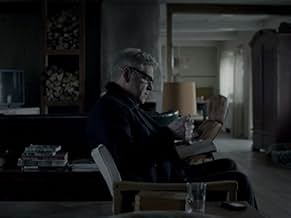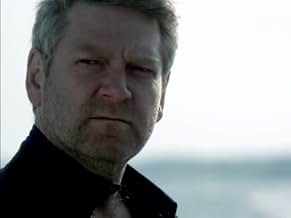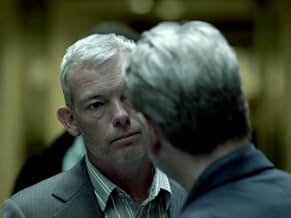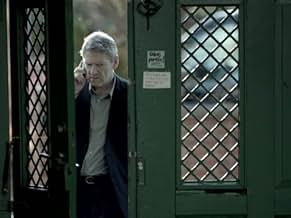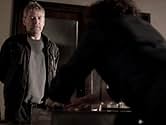Unable to unsee the dark crimes he's tasked to investigate, Wallander's job comes at a cost to his family and relationships.Unable to unsee the dark crimes he's tasked to investigate, Wallander's job comes at a cost to his family and relationships.Unable to unsee the dark crimes he's tasked to investigate, Wallander's job comes at a cost to his family and relationships.
- Nominated for 2 Primetime Emmys
- 12 wins & 31 nominations total
Browse episodes
Featured reviews
10fm_4797
This is a series of high quality with storyline based on the successful novels of Henning Mankell and on an outstanding actor in the leading role.
Why you MUST see it?
If you prefer a series that is based on quality and not visual effects you should definitely go for it.
Why you MUST see it?
- Incredible character development! Wallander's personality is an open book to the viewer who is in sympathy with him and is able to share their feelings with him as the plot reveals itself. The series manages to depict a great and charming contradiction. Wallander is a compassionate inspector who suffers from the murders he encounters during his investigations. He is inappropriately compassionate for this job yet he does everything for it. Although misery follows his personal life he doesn't lose hope and believes in the goodness of people. This is that gives him the dimension of a hero even though he is presented incredibly ordinary and human who often make mistakes.
- Really good acting from the most of the cast.
- Amazing directing which transfers completely the atmosphere of Sweden. It is really good that BBC decided to film the series in Sweden as it provides ideal landscapes for photography and directing and greatly matches with the melancholic personality of Wallander and with the original script of course.
- Solid script that follows consistently enough Mankell's novels.
If you prefer a series that is based on quality and not visual effects you should definitely go for it.
Detective Kurt Wallander, a man in perpetual need of a shave and a healthy meal is a noir-by-day modern gumshoe fighting for justice. His dedication has cost him. His wife left him after finding out he's already married to his work. His daughter is an earnest and dutiful supporter of the detective, but oblivious to the evil his eyes see daily. Not sure how he's doing it, but Kenneth Branagh OWNS this role and he's *really* appealing as this frayed-at-the-edges public servant. Shot like a mini-series, or a movie for TV, I admit I am impressed with his ability to flex into this role that is so utterly unlike his Shakespeare work. Frankly, he acts circles around the other cast members. A must-see for the mildest Branagh fan and good enough for any mystery/detective story lover. FYI: Disc 1 has two episodes. Disc 2 has one episode and special features that has spoilers if you don't see the other shows first. I was disappointed that I saw the 3rd episode before the first two. I understand there are 3 more episodes ordered for 2010. 07/09
Both the first series of Swedish TV's Wallander and the second collection of British TV's interpretations have recently been aired on British TV, and whilstthey share a number of elements and qualities (locations, excellent filmatography, thoughtful and impressive 'takes' on the central figure of Kurt Wallander), it's the differences that seem to separate a good television drama from an outstanding one.
Obviously the two productions differ in a number of basic ways and it's worth highlighting these as a given. For the most part Swedish Wallander uses Mankel's stories as inspiration, creating unique plots per episode, whilst British Wallander uses the source material and thus far has for the most part faithfully adapted 6 of Mankel's books (interestingly the choice has been to adapt out of sequence, although the original stories were also published out of sequence, in Britian at least). An exception is the depiction of Kurt's father and his struggle with dementia, which logically has to progress through the overall TV series.
A second key difference is the interpretation of Kurt Wallander's relationship with his daughter. Swedish TV puts Linda into the police force from the outset, and uses this device to explore their legendary troubled relationship with the added frisson of professional, hierarchical tensions. Also into the mix is the relationship between Linda and her colleague Stefan Lindman. British Wallander maintains the original Linda/Kurt story arc, with Linda not yet having enrolled for police duty.
A third difference is the inclusion/exclusion of the Ann-Britt Höglund character. It seems the Swedish version quickly came to view this character as unnecessary within the looser story structure, as she is dispensed with well before Series One concludes. For British TV Höglund remains integral, just as she is in the books.
However, setting aside these givens, there are a number of factors which set the two interpretations apart in terms of quality, success and viewer experience. British Wallander is quite pacey, moving the story along briskly from scene to scene. Whilst this mostly works, it does occasionally occur at the expense of scene and/or character development - the camera (and therefore the viewer) is forced to follow Kurt, leaving other characters as cyphers. This is most notable during scenes with colleagues at police HQ. Swedish Wallander adopts a slower style, allowing characters and stories to develop and unfold with greater subtlety. This approach leads to a second and quite fundamental difference, and it is this element that underlines the superiority of the Swedish Wallander. The combination of writing, direction and editing for a slower pace allows the Swedish actors to effectively 'do less' and achieve more. Accordingly, Henricksson, Bergman, Sällström, Rapace et al are repeatedly given the time and direction to use economy and skill to enable the viewer to understand what they are thinking, feeling etc. The final episode of Series One was a particular example of this, with all concerned but particularly Sällström and Henricksson underplaying beautifully to create scenes of desperate sadness, bewilderment and loss whilst actually 'doing' very little. In comparison, a combination of misjudged casting and actors being let down by script and scene construction in the British version means for the most part the viewer receives less reward. Branagh, Warner and most notably McCabe as Nyberg are the exceptions, the former not least because Wallander remains the prime focus through the British drama, and is therefore given more time, scene-by-scene, and Warner because he is quite simply an experienced and clever film actor. Yet it is McCabe who shines, underplaying beautifully, especially during scenes in Episode 4 - The Faceless Killers.
Views on casting are always contentious. Suffice to say, the Swedish series has somehow managed to secure a host of clever actors who know a thing or two about camera work, and particularly scenes in close-up. From the moments of occasional humour gratefully received from Mörck's Ebba and Gunnarsson's Svartman (an incidental and unsung masterpiece of a performance) to the brilliance of Henricksson and Sällström, it's the Swedish production which holds the treats and subtleties and warrants repeat viewings.
The British Wallander is indeed watchable, but let's hope the BBC transmits Series 2 of the Swedish production as soon as possible, and let's also hope the absence of Rapace and Sällström doesn't diminish what has been an excellent television production.
Obviously the two productions differ in a number of basic ways and it's worth highlighting these as a given. For the most part Swedish Wallander uses Mankel's stories as inspiration, creating unique plots per episode, whilst British Wallander uses the source material and thus far has for the most part faithfully adapted 6 of Mankel's books (interestingly the choice has been to adapt out of sequence, although the original stories were also published out of sequence, in Britian at least). An exception is the depiction of Kurt's father and his struggle with dementia, which logically has to progress through the overall TV series.
A second key difference is the interpretation of Kurt Wallander's relationship with his daughter. Swedish TV puts Linda into the police force from the outset, and uses this device to explore their legendary troubled relationship with the added frisson of professional, hierarchical tensions. Also into the mix is the relationship between Linda and her colleague Stefan Lindman. British Wallander maintains the original Linda/Kurt story arc, with Linda not yet having enrolled for police duty.
A third difference is the inclusion/exclusion of the Ann-Britt Höglund character. It seems the Swedish version quickly came to view this character as unnecessary within the looser story structure, as she is dispensed with well before Series One concludes. For British TV Höglund remains integral, just as she is in the books.
However, setting aside these givens, there are a number of factors which set the two interpretations apart in terms of quality, success and viewer experience. British Wallander is quite pacey, moving the story along briskly from scene to scene. Whilst this mostly works, it does occasionally occur at the expense of scene and/or character development - the camera (and therefore the viewer) is forced to follow Kurt, leaving other characters as cyphers. This is most notable during scenes with colleagues at police HQ. Swedish Wallander adopts a slower style, allowing characters and stories to develop and unfold with greater subtlety. This approach leads to a second and quite fundamental difference, and it is this element that underlines the superiority of the Swedish Wallander. The combination of writing, direction and editing for a slower pace allows the Swedish actors to effectively 'do less' and achieve more. Accordingly, Henricksson, Bergman, Sällström, Rapace et al are repeatedly given the time and direction to use economy and skill to enable the viewer to understand what they are thinking, feeling etc. The final episode of Series One was a particular example of this, with all concerned but particularly Sällström and Henricksson underplaying beautifully to create scenes of desperate sadness, bewilderment and loss whilst actually 'doing' very little. In comparison, a combination of misjudged casting and actors being let down by script and scene construction in the British version means for the most part the viewer receives less reward. Branagh, Warner and most notably McCabe as Nyberg are the exceptions, the former not least because Wallander remains the prime focus through the British drama, and is therefore given more time, scene-by-scene, and Warner because he is quite simply an experienced and clever film actor. Yet it is McCabe who shines, underplaying beautifully, especially during scenes in Episode 4 - The Faceless Killers.
Views on casting are always contentious. Suffice to say, the Swedish series has somehow managed to secure a host of clever actors who know a thing or two about camera work, and particularly scenes in close-up. From the moments of occasional humour gratefully received from Mörck's Ebba and Gunnarsson's Svartman (an incidental and unsung masterpiece of a performance) to the brilliance of Henricksson and Sällström, it's the Swedish production which holds the treats and subtleties and warrants repeat viewings.
The British Wallander is indeed watchable, but let's hope the BBC transmits Series 2 of the Swedish production as soon as possible, and let's also hope the absence of Rapace and Sällström doesn't diminish what has been an excellent television production.
Watching two episodes of "Wallander" makes me think of Isabelle Huppert's line in Hal Hartley's great "Amateur": "everything I write comes out sad. Why do you think that is?" Kenneth Brannagh's shambling, weary detective Kurt Wallander is as far from TV's 'Columbo' as it's possible to get, despite certain physical similarities.
In a way that I seem to recognise as uniquely Nordic, Wallander goes about his daily business – solving murders – with a residual sadness on him and his world, and everything in the show – from the art-house photography and pared-down sets, to the score, to his life and to each episode's stories themselves – helps create a consistent portrait, so that by the time I settled down for episode two, Wallander's appearance was an automatic trigger to a certain state of mind.
Each classy episode takes its time, draws visual comparisons, sets Wallander up in his world, makes you know him better. I'm loving it : it's on a par with the excellent French TV thriller "Engrenages" that previously appeared on BBC4, and anything ever so slightly formulaic about the story lines in each episode is offset by the serious and committed acting, the well-drawn characterisation, the consistent visual tone. I'm so glad they avoided the Meryl Streep world of accents and wholesale removal of the drama to the UK (or USA). These are Swedish characters in a Swedish town who write in Swedish – it's just that we're hearing them in English. And this technique allows them to cast truly excellent English supporting actors without any fear of uneven accents or geographic transitions that don't work so well. (No English forest ever looks quite like a Scandinavian one. And the British don't so much do sadness and mournful humour, as bleakness and black humour – they're quite different.)
I saw Kenneth Brannagh as an electrifying 'Hamlet' on stage in the late 80s, and this feels something like being reacquainted with an old ghost. He's no longer young, and he's not beautiful, but he makes masterful use of his eyes, his voice, the very weariness life has given him – to create a memorable man, not just a cartoon portrait. Highly recommended.
In a way that I seem to recognise as uniquely Nordic, Wallander goes about his daily business – solving murders – with a residual sadness on him and his world, and everything in the show – from the art-house photography and pared-down sets, to the score, to his life and to each episode's stories themselves – helps create a consistent portrait, so that by the time I settled down for episode two, Wallander's appearance was an automatic trigger to a certain state of mind.
Each classy episode takes its time, draws visual comparisons, sets Wallander up in his world, makes you know him better. I'm loving it : it's on a par with the excellent French TV thriller "Engrenages" that previously appeared on BBC4, and anything ever so slightly formulaic about the story lines in each episode is offset by the serious and committed acting, the well-drawn characterisation, the consistent visual tone. I'm so glad they avoided the Meryl Streep world of accents and wholesale removal of the drama to the UK (or USA). These are Swedish characters in a Swedish town who write in Swedish – it's just that we're hearing them in English. And this technique allows them to cast truly excellent English supporting actors without any fear of uneven accents or geographic transitions that don't work so well. (No English forest ever looks quite like a Scandinavian one. And the British don't so much do sadness and mournful humour, as bleakness and black humour – they're quite different.)
I saw Kenneth Brannagh as an electrifying 'Hamlet' on stage in the late 80s, and this feels something like being reacquainted with an old ghost. He's no longer young, and he's not beautiful, but he makes masterful use of his eyes, his voice, the very weariness life has given him – to create a memorable man, not just a cartoon portrait. Highly recommended.
The other thing is that Kenneth Branagh is an international star, thus his Wallander is more distinguishing and less team player: his colleagues have less importance and less time on screen than in the Swedish version. Branagh's Wallander is also more unsociable and seems more depressed, underlined by long scenes focusing on his face expression under driving or walking. The big plus is that the Brits have tried to create the Swedish atmosphere as much as possible, signs are in Swedish etc. Well, the UK and Sweden have same latitudes, so the filming of Swedish nature was also possible in England.
Nevertheless, if you like Scandinavian crime thrillers (with slower pace, minimum explosions/chases, long nature frames), then the Wallander series is definitely for you. However, the "trinity" series is better to watch in a temporal sequence, they have some references to earlier events.
Nevertheless, if you like Scandinavian crime thrillers (with slower pace, minimum explosions/chases, long nature frames), then the Wallander series is definitely for you. However, the "trinity" series is better to watch in a temporal sequence, they have some references to earlier events.
Did you know
- TriviaMost Swedish critics consider this the best movie or television adaptation of the Wallander canon, in particular because of Sir Kenneth Branagh's performance. The most prominent newspaper in southern Sweden (where the series was set and filmed) acknowledged this with an article whose title translates as "Wåll-and-ör- The Real Wallander" (the first part pokes fun at the way Wallander's name is pronounced in English).
- ConnectionsFeatured in Breakfast: Episode dated 7 June 2010 (2010)
Details
Contribute to this page
Suggest an edit or add missing content

Top Gap
What is the Hindi language plot outline for Les enquêtes de l'inspecteur Wallander (2008)?
Answer






